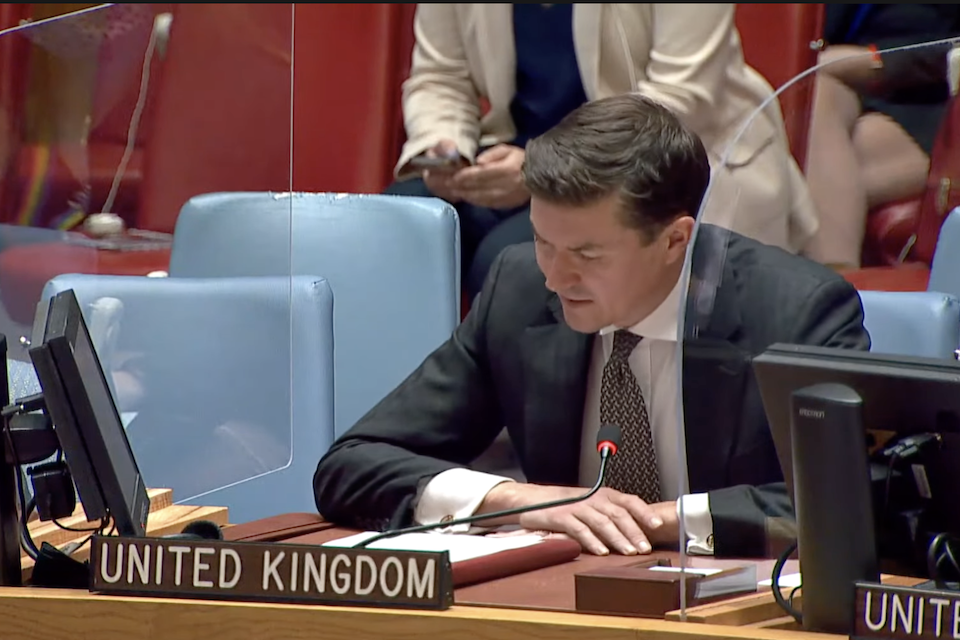Progressing the transition towards a more peaceful and stable DRC
Statement by Ambassador James Roscoe at the Security Council briefing on MONUSCO

Mr President, may I begin by welcoming back SRSG Keita to the chamber, it’s very good to see you here in person and we’re very grateful for your briefing. I’m also grateful to Ms Kalala for her briefing and to you Mr President for your insights in your role as chair of the 1533 Committee and it’s visit. I want to focus this intervention on three issues: Uganda’s intervention in eastern DRC; the state of siege; and then MONUSCO mandate renewal.
Firstly Mr President, the UK is closely following developments in eastern DRC following the launch of joint operations there by the Ugandan People’s Defence Force and the DRC armed forces against the Allied Democratic Forces.
Coordination will be essential to maximise operational impact, and minimise the risk posed to civilians, UN personnel, and humanitarian actors, as well as the risk of unintended action between the forces.
We therefore stress the need for effective information sharing and coordination between the UPDF, DRC armed forces and MONUSCO on any military action, including location, nature and objectives, and also with humanitarian actors to enable access to those likely to be displaced or affected. We welcome the steps taken by the parties to begin this information sharing in the role that you SRSG have played in the region in facilitating that.
The UK also underscores the necessity of conducting all operations in full respect of international humanitarian law and international human rights law, and where appropriate, in strict compliance with the UN Human Rights Due Diligence Policy (HRDDP) and again it was reassuring SRSG to hear that your report on Human Rights compliance by all actors in your territory.
Whilst UDPF-FARDC operations take place against the backdrop of improved regional relations, we encourage all governments to use existing regional mechanisms to share information about these operations in order to reduce the risk of unintended harm.
Mr President, turning now to the state of siege, the UK acknowledges FARDC and MONUSCO efforts against armed groups in eastern DRC but remains concerned by persistent armed group activity, and the consequent civilian death, injury and displacement that brings.
We reiterate our call on the Government of the DRC to ensure the state of siege is transparent, that it’s time-bound, we note today that we’re in the 13th extension of the state and implemented with full respect for international humanitarian and international human rights law and again it was worrying to hear in the briefing today about the rise in human rights abuses across the country.
We would also urge the Government of DRC to ensure the necessary resources reach the responsible actors in the east. And we welcome investigations into allegations of embezzlement of funds for military operations and encourage the DRC authorities to ensure accountability for those responsible. We encourage the Government of the DRC to follow the other recommendations of the Defence and Security Standing Committee, including the development of an exit strategy from the state of siege.
Mr President, as we approach MONUSCO’s mandate renewal, let me briefly highlight the UK’s priorities.
We want to see the implementation of MONUSCO’s Transition Plan make progress. Continued discussions by the Joint MONUSCO – Government of DRC working group will be essential in this regard.
We also wish to see further consolidation of MONUSCO’s presence in Ituri, and North and South Kivu, in order to enable MONUSCO to focus on the minimum conditions required for its eventual exit. We expect the full and effective engagement of all Protection of Civilians components, including MONUSCO’s Force Intervention Brigade (FIB), to achieve this.
Progressing MONUSCO’s transition and enabling a focus on the minimum conditions in Ituri, and North and South Kivu, will also be facilitated by preparations for the early transfer of certain tasks: those that are not central to meeting the minimum conditions for withdrawal, and those that the Government of DRC, UN Country Team and other international partners could reasonably assume responsibility for already.
Mr President, in conclusion, the UK supports a gradual, sustainable withdrawal of MONUSCO, guided by an end state, rather than an end date. MONUSCO and the Government of the DRC continue to have our full support in their efforts to achieve this, and to ensure a more peaceful, stable and prosperous DRC and may I Mr President, just at the end, through the SRSG thank her and all of her staff and the peacekeepers in MONUSCO in what we know continue to be very difficult conditions.
Thank you.